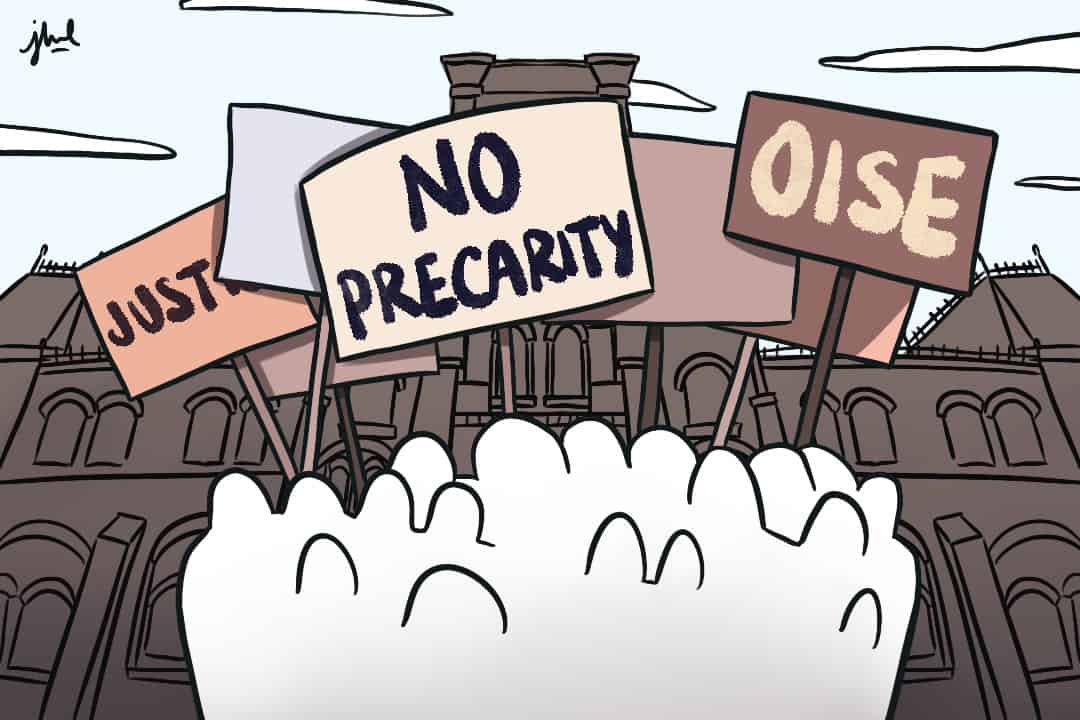On October 24, Scholars Strike Canada — a group of university workers, activists, and organizers with connections to academia — held an online teach-in panel that they called “Refusing the Neoliberal Carrot: Academic Precarity and Solidarity.” The panel session was part of a two-day series the organization called “Teaching and Learning Against Social Abandonment,” which included other sessions on topics surrounding academic freedom and university faculty’s job security.
The Neoliberal Carrot panel included four academic workers and organizers, including current Assistant Professor in Writing Studies at UTM Sheila Batacharya, and former — or “exiled,” as Scholar Strike puts it — Ontario Institute for Studies in Education (OISE) contract lecturer Vannina Sztainbok. The panellists spoke about their experiences with precarious academic work and discussed how they are a symptom of larger, structural issues in academic job insecurity.
The other two panellists, Zoë Newman and Stephanie Latella, are faculty at York University. Latella is an academic and contract instructor and a PhD candidate in Social and Political Thought. Newman is on the bargaining team of the Canadian Union of Public Employees (CUPE) Local 3903 — the union representing York University’s contract faculty, teaching assistants, graduate assistants, and research assistants — as contract faculty
Along with Sztainbok, Newman is also part of the Precarity Collective — a group that formed out of the original “No Precarious Employment” campaign, which arose in response to OISE’s Social Justice in Education department’s abrupt release of Sztainbok from their faculty in 2022. The two are working together toward a podcast project called “Talking Precarity.”
Precarity in post-secondary education
The panel acknowledged that precarity can look differently and take many forms, and conceptualized employment precarity as having employment that lacks continuity or certainty of duration, being under-valued and under-supported, and often being exploited. Panellists described experiences of being paid less for courses, being contracted term-by-term, not being funded for mentoring or researching, being looked down on by tenured faculty members, and being expected to perform unpaid work such as grading assignments after contract time. They also emphasized the disproportionate effect of precariousness on racialized, queer, and disabled people.
According to CUPE, more than half of undergraduates are taught by faculty members in precarious positions. Panellists highlighted an increasing trend of increasing precarity in the economy within the last few decades and described precarity as a necessity of capitalism, which sustains institutions in academia through the exploitation of their workforce.
Describing the precarious state of academic employment as made up of a “neoliberal carrot [and] stick,” the panellists argued that it results in conformity and a lack of academic freedom. Thus, Sztainbok describes academic employment as “a tool, a threat, and a promise” which reproduces “the ethos of neoliberalism.” The panel consistently warned of detriments in financial and mental well-being as a direct result of precarity.
Precarity at U of T
The panellists described that U of T is no exception to the general trend of using precarious employment in post-secondary institutions. “There’s an inherent contradiction when you are relying on people who you claim are not excellent enough to deserve job security, but you tell your students that you offer the best education in the world,” Sztainbok said.
Statistics for the number or share of courses of non-tenure-track faculty members are hard to come by, as U of T only publishes employment statistics for appointed faculty members. This excludes “sessional instructors, hired to teach courses, clinical faculty (ono-appointed) [sic], and faculty who hold status-only or adjunct appointments,” which Sztainbok described as other positions of relative precarity. In the published 2021 data, 709 out of 3,390 appointed faculty members were on limited-term contracts, including 389 part-time faculty members.
Sztainbok and the No Precarious Employment campaign had previously raised criticism of the nefarious part-time employment policy and its detrimental effects on faculties. This precarity can also affect students’ research — Sztainbok’s contract unexpectedly ended while she was in the middle of supervising two master’s theses.
In an email statement, the university wrote that “only full graduate faculty members can be primary supervisors, and virtually all of these are in the continuing tenure stream, so there’s largely no issues regarding graduate supervision continuity.”
Sztainbok disputed this assertion. “In some departments, there are students who end up taking the majority of their courses with adjunct faculty. Who are they going to turn to to ask for references? Who is going to assist them when they apply for grad school, or for grants? Who knows their work well enough to support their research agenda?” she wrote in an email to The Varsity.
“Contract or sessional workers have a lot in common with other gig workers, for example when it comes to how our work is broken up into smaller and smaller pieces or contracts,” Newman said.
Similarly, Sztainbok noted during the panel discussion that “academics are not special, [they] are workers.” She and other panellists raised the need for unity and solidarity between precarious or part-time and tenure-track faculties, as well as between workers of all professions. The panel emphasized organizing widely and using solidarity as a support system to protect each other against precarious work.



No comments to display.